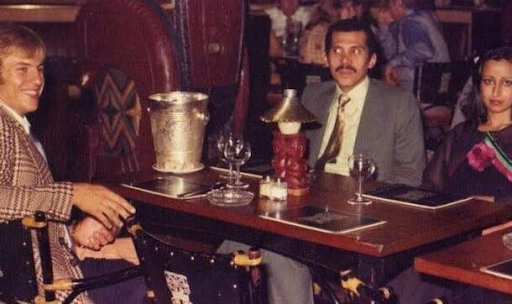
Eammon O’Keefe was living a life of luxury when he was signed by Al-Hilal, but because of unrequited love, he had to flee the country
In 1976, Englishman Eamonn O’Keefe made history by becoming the first European player to play in Saudi Arabia. At the age of 22, the striker swapped the cold of Manchester for the scorching heat of the desert when he signed with Al-Hilal. The offer was irresistible: a tax-free salary, apartment, car, telephone (something considered a luxury at the time) and all-expenses paid for international travel.
However, behind the million-dollar contract and the perks, an unexpected situation led the young man to make a drastic decision: to flee the country to protect his life and that of his family because of an unrequited love.
The invitation and arrival in the Middle East
O’Keefe was playing for the modest Hyde United, in an amateur league in England, when he received a call from George Smith, his former coach, who had recently accepted to manage Al-Hilal.
Shortly after, O’Keefe embarked on a trial period. Despite being concerned about the intense heat and cultural differences, his performance was convincing. Within two weeks, the Saudi leaders decided to hire him.
When it was time to sign the contract, he heard the following phrase from Prince Abdullah bin Nasser, then president of Al-Hilal and grandson of the founder of Saudi Arabia: “Write whatever you want”. O’Keefe asked for an apartment, a car and a plane ticket to settle pending matters in England. Everything was granted immediately, without any imposition from the prince.
Declaration of love in an elevator
However, the life of luxury soon turned into a tense scene. O’Keefe was invited by the prince to take a trip with one of his wives. They would start in England and then make a tour, passing through France, Italy and Tunisia.
However, one day, after a night out at a casino in Nice, France, the two were in a panoramic elevator and O’Keefe was surprised by a confession: “I’m a fan, I love you.” Disconcerted, the player retorted: “Like a brother?” The answer was clear: “No. Not like a brother.” O’Keefe gently said he was not interested. The prince then said that they would return to having a relationship just as “president and player”.
O’Keefe then realized that he was in a complicated situation. However, he needed to act cautiously. Back in Saudi Arabia, he revealed the story to coach George Smith.
However, the instructions were clear: “You can’t stay here any longer. The prince won’t take no for an answer.” Pretending that his father was ill, the attacker asked for permission to travel to England in a hurry. The prince, however, hesitated, but allowed him to board. With only enough clothes to last a week—so as not to arouse suspicion—O’Keefe left the country with his family and never returned.
Hasty escape to England
Back in England, but fearful of being persecuted, he asked the English Football Association (FA) for help to officially release himself from his contract with Al-Hilal. However, to cut ties once and for all, he was advised by the directors to say the following to the prince: “I told my wife what happened and she was horrified. I’m not coming back.” When Abdullah called, O’Keefe repeated the phrase. There was no answer on the other end of the line. It was the last time he had contact with the director.
Thus, freed from his contract, the striker continued his career in Europe, defending clubs such as Everton and the Irish national team, the country that chose to allow him to be of national origin. In a recent interview with the British TV network BBC, O’Keefe said that he still remembers his Saudi teammates fondly and regrets not having said goodbye to them. “They were fantastic. Without a wife and children, I might have stayed. But at that moment, I felt that my life was at risk,” he said.